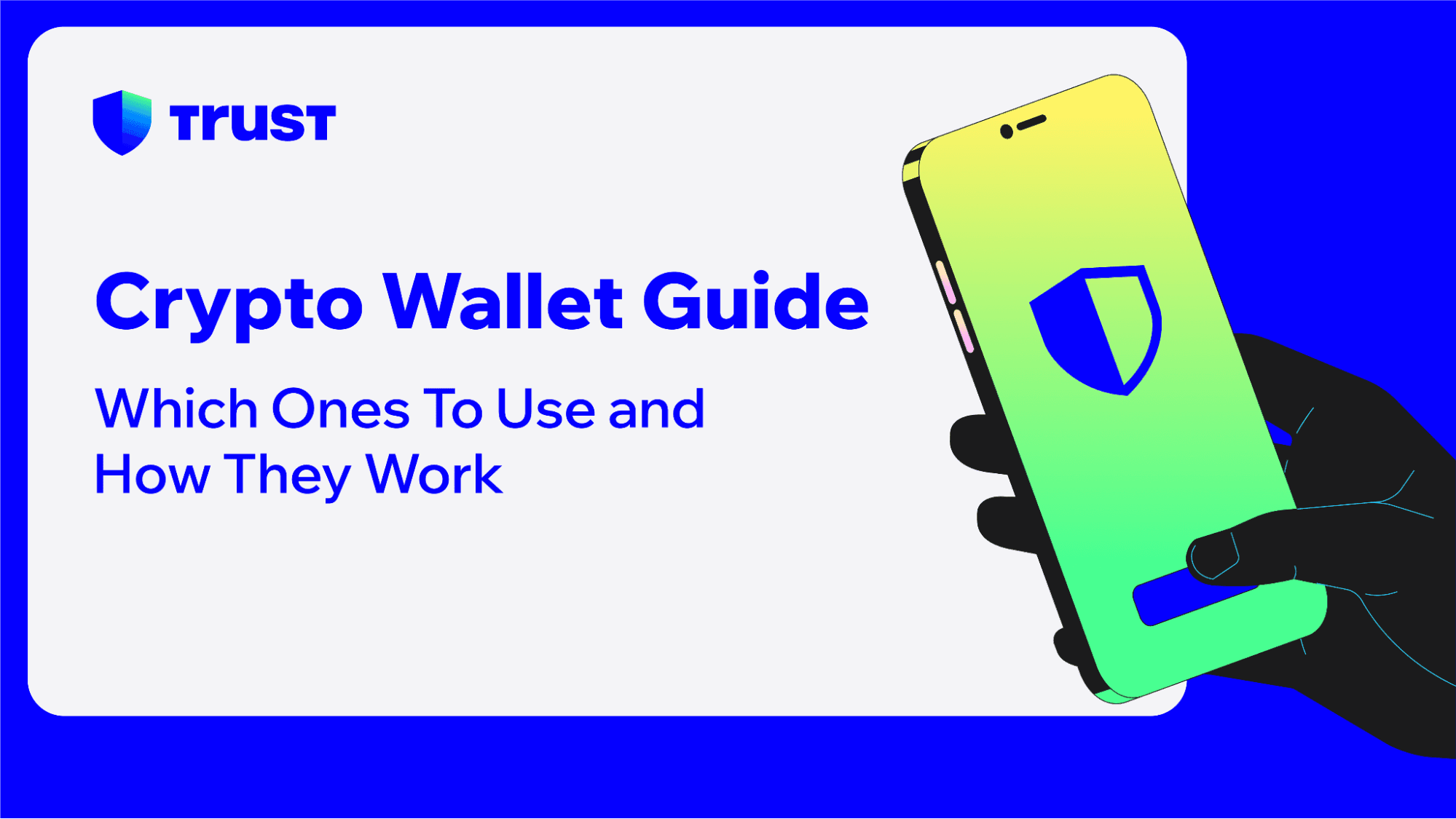Guides
Crypto Wallet Guide: Which Ones To Use and How They Work
Share post
In Brief
Discover which crypto wallet is best for you and learn how they work in our comprehensive and easy to understand wallet guide.

Introduction
This guide is designed to demystify crypto wallets – helping you understand their types, functionalities, and how they seamlessly integrate into your digital financial activities, from basic transactions to advanced Web3 interactions. You’ll also learn which kinds of crypto wallets are best for your unique situation, whether you want to store crypto assets long-term, earn crypto rewards, access blockchain games, and so much more.
Cryptocurrency and Web3 are rapidly reshaping our financial landscape, offering unprecedented control and autonomy over personal assets. Central to navigating this new terrain is the crypto wallet, a crucial tool for anyone engaging with digital currencies. Serving not only as a means to manage digital assets, crypto wallets also act as gateways to the vast and diverse world of Web3, enabling interactions with decentralized applications (dApps) and broader blockchain ecosystems.
Crypto wallet definition
A crypto wallet is a digital wallet that allows users to manage their cryptocurrencies and access decentralized applications, otherwise known as dApps. Unlike a physical wallet, which holds physical currency, a crypto wallet doesn't store physical coins or notes. Instead, it stores the cryptographic information needed to access cryptocurrency funds.
This information includes a combination of private and public cryptographic keys. The wallet interfaces with various blockchain networks, allowing users to monitor their balance, send and receive digital currencies, and conduct other operations.
Crypto wallets, such as Trust Wallet, allow you to manage 10M+ crypto assets across 100+ blockchain networks. Additionally, it comes with built-in features like the Trust Wallet Security Scanner that make accessing dApps and doing transactions safer. Trust Wallet is available as a mobile app for iOS and Android, as well as a desktop browser extension.
Which wallet is the best for crypto?
Choosing the right crypto wallet for you depends on your specific needs, such as the frequency of transactions, the amount of crypto you hold, and your security plan. Below we’ll go through three main types of wallets including:
Software wallets
Hardware wallets
Paper wallets
Let's break down the key features of different types and what to look for in an ideal wallet.
Crypto software wallets: Convenience and functionality
A software wallet is an application that resides on your computer, desktop browser, smartphone, or online. They offer easy and quick access to your digital assets and allow you to conveniently connect with Web3 decentralized applications at the tap or click of a button.
Software wallets are a popular choice for those who frequently transact with crypto or prefer seamless access to their digital assets. The key advantage of software wallets lies in their immediate accessibility and their functionality, which allows them to seamlessly connect to dApps, be used for crypto payments, digital IDs and so much more.
Trust Wallet is a prime example of a software wallet that can be used on a mobile device such as your Apple device or Android. It can also be used as a desktop browser extension on your personal computer. If that’s an option you’re interested you can try the Trust Wallet browser extension.

Crypto hardware wallets: Designed for added layer of security
Hardware wallets are considered one of the safest ways to store and manage crypto. A hardware wallet is a tangible device designed to keep your private keys in a secure setting, isolated from any online access. Similar to other types of cryptocurrency wallets, it enables users to authorize transactions and engage with the blockchain network.
Hardware wallets are often recommended for users who wish to have an extra physical layer of security for their crypto assets or for those who wish to store their crypto assets for a long time without frequent transactions. While hardware wallets offer an extra layer of security, the trade-off comes in the form of less immediate convenience. For instance, executing transactions might take a bit longer compared to a software wallet, as it requires the physical device to be connected to a computer or a smartphone.
Can hardware wallets and software wallets be used simultaneously?
Yes, you can use hardware wallets and software wallets together. This setup gives you a great mix of security and convenience. For example, you can connect a hardware wallet, like Ledger, to a software wallet, such as the Trust Wallet browser extension.
Here's how this combination works to your advantage:
Security: Your hardware wallet keeps your private keys offline and safe from online threats. This means your crypto is more secure from hacking and other online risks.
Convenience: The software wallet offers an easy-to-use interface. You can quickly check your balances, execute transactions, and explore different crypto services.
Combined Benefits: When you link your hardware wallet to a software wallet, you get the security of the hardware wallet and the user-friendly features of the software wallet. This way, you can safely engage in a variety of crypto activities, like trading or using decentralized apps, while your hardware wallet provides a strong layer of protection for your assets.
Crypto Paper Wallets: A Less Common, Yet Viable Option
While software and hardware wallets are more commonly used, paper wallets still have their place in the crypto world. A paper wallet is essentially a physical document that contains all the necessary data to generate a number of private keys. It's a form of cold storage, meaning it's not connected to the internet, which can be a big plus in terms of security.
Choosing a paper wallet is an option that appeals to those who prioritize enhanced security and simplicity. Since paper wallets are offline, they are immune to online hacking attempts. This feature makes them a great choice for the long-term storage of crypto assets. Their straightforward nature means they don’t require the technical knowledge often needed for hardware or software wallets, and you maintain complete control over your private keys and, consequently, your crypto assets.
However, using a paper wallet comes with its set of challenges. The most significant risk is physical damage or loss. If the paper is damaged or lost, the information it holds – and thereby access to the crypto assets – is also lost. This necessitates a very secure and safe storage method for the paper wallet. Another limitation is the inconvenience in executing transactions. Unlike digital wallets, to make a transaction with a paper wallet, you would typically need to transfer your crypto to a software wallet first, which can be a bit cumbersome. This makes paper wallets less suitable for those who are actively trading or need regular access to their crypto assets.
Paper wallets are particularly suited for those looking for a simple, highly secure method for storing crypto for the long term. However, this comes at the cost of convenience and ease of use, particularly for those who engage in frequent crypto transactions.
Are There Free Crypto Wallets?
Absolutely, there are free crypto wallets out there, especially when we talk about software wallets. For instance, popular software wallets like Trust Wallet are free to download and use. These wallets are available as mobile apps for your phone or as browser extensions for your computer. They provide the basic functionalities needed for handling cryptocurrencies – such as sending, receiving, and storing various digital assets.
However, it's a different story with hardware wallets. Unlike their software counterparts, hardware wallets often come with a price tag. These are physical devices designed to offer enhanced security for your crypto assets, and they need to be ordered and purchased. The cost reflects the added security features and the physical nature of the product.
So, in summary, if you're looking for a cost-effective way to manage your crypto, software wallets are a great option. They're easily accessible and free to use, though you'll still need to handle transaction fees that are part of using the blockchain network. On the other hand, for those looking for a higher level of security and who don't mind spending a bit, hardware wallets can be a valuable investment.
Do I Really Need a Crypto Wallet?
Think of a crypto wallet like your everyday wallet, but for digital currencies. If you plan to buy, store, or use cryptocurrencies, then yes, you definitely need a crypto wallet. It's not just about having a place to keep your digital coins; it's about security and functionality. A crypto wallet provides you with the cryptographic keys required to interact with the blockchain, whether you're sending Bitcoin to a friend, receiving Ethereum from a transaction, or even accessing cool decentralized apps (dApps).
Without a wallet, you can't really do much with your cryptocurrencies. Plus, it's about having control over your digital assets. Unlike keeping your crypto on an exchange, where you're essentially entrusting your assets to a third party, a wallet gives you personal control. It's like being the sole owner and guard of your digital treasure.
How Do I Get a Crypto Wallet?
Getting a crypto wallet is really simple. Here's a quick rundown:
Choose Your Wallet Type: First, decide whether you want a software, hardware, or paper wallet. Software wallets are typically free, are great for easy access and regular use, hardware wallets are best for high security, and paper wallets are good for secure, long-term storage.
Download or Purchase: For a software wallet, simply download it from the provider's website or app store. Trust Wallet, for instance, can be downloaded onto your smartphone or as a browser extension.
Here’s how to get started with a secure crypto wallet.
Step 1: Get the most updated version of Trust Wallet
Below you’ll see the steps to create a new wallet, but you could just as easily import an existing Web3 wallet to Trust Wallet, if that’s your preference.
To create a new wallet:
Download, install and then open Trust Wallet
Choose “Create a new wallet”.
Choose your backup option, or you can optionally postpone the backup process by choosing “Skip”.
Start using Trust Wallet.

And that’s it, you have a secure crypto wallet. From here you can do a number of things such as buy crypto, stake your crypto to earn rewards and much more.
With millions of users worldwide, Trust Wallet is more than just a simple-to-use crypto wallet—it's your open gateway to the Web3 world. Built on our core values of financial freedom, strong security, and user-friendly design, we're on a mission to build a seamless Web3 hub and open ecosystem for everyone. Buy crypto, swap tokens, stake to earn rewards, and so much more. Whether you're a beginner or an expert, Trust Wallet empowers you to fully own, control, and leverage your digital assets.
With key features like the Trust Wallet Security Scanner and support for 10+ million digital assets across 100+ blockchains, you can explore and access opportunities in Web3 with confidence. Trust Wallet is available as a mobile app on Apple iOS and Android, and also as the Trust Wallet Chrome Extension for desktops.
Join the Trust Wallet community on Telegram Follow us on X (formerly Twitter) Instagram Facebook Reddit
Note: Any cited numbers, figures, or illustrations are reported at the time of writing, and are subject to change.





